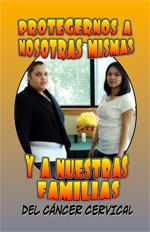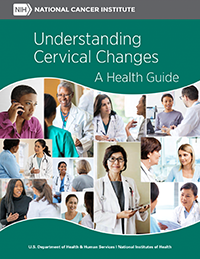Free Materials from NCCC
NCCC offers fact sheets about HPV and cervical cancer topics available free for download. These copyrighted materials may be reproduced but are not intended for commercial use or resale.
 NCCC is also pleased to offer a free fotonovela in English and Spanish: Protecting Ourselves and Our Families from Cervical Cancer/Protegernos a Nosotras Mismas y a Nuestras Familias del Cáncer Cervical. Latinas have the highest rates of cervical cancer of all groups of women in the US. This fotonovela shares the facts about HPV and cervical cancer prevention,from HPV testing to vaccines, through the story of two friends, Sara and Lucia.
NCCC is also pleased to offer a free fotonovela in English and Spanish: Protecting Ourselves and Our Families from Cervical Cancer/Protegernos a Nosotras Mismas y a Nuestras Familias del Cáncer Cervical. Latinas have the highest rates of cervical cancer of all groups of women in the US. This fotonovela shares the facts about HPV and cervical cancer prevention,from HPV testing to vaccines, through the story of two friends, Sara and Lucia.
The fotonovela is available as a free PDF download. The Spanish version is also available in digital format and can be embedded on your own website using code available here. The digital fotnovela can be viewed below.
Free Resources from the National Cancer Institute
The National Cancer Institute (NCI) offers publications on a variety of cancer topics.
 Understanding Cervical Changes: A Health Guide
Understanding Cervical Changes: A Health Guide
This guide helps you learn about cervical cancer screening. It explains when to get screened and next steps after a normal or abnormal Pap or human papillomavirus (HPV) test result. It may be reassuring to know that most abnormal cervical screening results are not cervical cancer, but rather early cervical cell changes that can be monitored or treated so they don’t cause health problems. The guide covers HPV infection, HPV-related cancers, cervical cancer screening tests, cervical cancer screening guidelines, Pap and HPV test results (ASC-US, AGC, LSIL, ASC-H, HSIL, AIS, or cervical cancer), follow-up procedures, such as colposcopy and biopsies, and treatments including cold knife conization, cryotherapy, laser therapy, and LEEP.
When Someone You Love Is Being Treated for Cancer: Support for Caregivers
When Someone You Love is Being Treated for Cancer is for friends or family members giving care to a person with cancer. Being a caregiver to someone you care about may mean helping with daily activities such as going to doctor’s visits or preparing food. It can also be coordinating care and services or offering emotional support. But during this time, it’s important that caregivers take care of themselves, too.
Taking Time: Support for People with Cancer
Taking Time is for people newly diagnosed with cancer. Family and friends may also want to read this booklet. Hearing that you have cancer changes your life, and the lives of those around you. The booklet discusses the many emotions that come with having cancer, as well as how to communicate with others about the disease. This booklet covers:
- The different feelings you may have and how to cope with and talk about them.
- Changes for your family and ways to talk with family members and friends
- Talking to your health care team about your cancer and what questions to ask
- Getting help and support from others
- Coping with a new self image and body changes
- Managing your day-to-day life with cancer
Additional titles cover taking part in a clinical trial, managing chemotherapy and radiation, cancer pain control, and life after cancer treatment,
